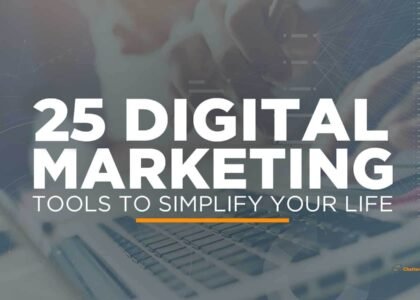Digital and Social Media Marketing: A Comprehensive Overview:
In today’s fast-paced digital landscape, businesses must adapt to the evolving marketing environment to thrive. Digital marketing, encompassing a variety of online channels and strategies, has become essential for reaching and engaging consumers. This article explores the key components of digital and social media marketing, their importance, and how businesses can effectively leverage these tools.
Understanding Digital Marketing:

Digital marketing refers to the promotion of products and services using digital channels such as websites, social media, search engines, email, and mobile applications. Unlike traditional marketing, which relies heavily on print, television, and radio, digital marketing allows for more targeted, measurable, and interactive campaigns. As the internet continues to dominate consumer behavior, digital marketing is projected to reach $786 billion by 2026, highlighting its growing significance in the business world[1][2].
Key Components of Digital Marketing:
1. Search Engine Optimization (SEO):SEO involves optimizing a website to improve its visibility in search engine results. By using relevant keywords and creating high-quality content, businesses can enhance their organic search rankings, driving more traffic to their sites.
2. Pay-Per-Click Advertising (PPC): PPC is a model of online advertising where businesses pay a fee each time their ad is clicked. This can be an effective way to generate immediate traffic and leads, particularly through platforms like Google Ads and social media.
3. Content Marketing: This strategy focuses on creating and distributing valuable content to attract and engage a target audience. Blogs, videos, infographics, and e-books are common formats that help establish authority and drive customer loyalty.
4. Social Media Marketing: Social media platforms like Facebook, Instagram, Twitter, and LinkedIn provide businesses with opportunities to connect with their audience directly. By sharing content, engaging with followers, and running targeted ads, brands can enhance their visibility and foster community.
5. Email Marketing: Email remains one of the most effective digital marketing channels. By sending personalized messages and promotions to subscribers, businesses can nurture leads and encourage repeat purchases.
6. Affiliate Marketing: This performance-based marketing strategy involves partnering with affiliates who promote a company’s products in exchange for a commission on sales generated through their efforts. This can expand reach and drive conversions without upfront costs.
7. Influencer Marketing: Collaborating with influencers who have a significant following allows brands to tap into established audiences. Influencers can authentically promote products, enhancing credibility and reach.
The Importance of Social Media Marketing:

Social media marketing is a crucial aspect of digital marketing, as it allows brands to engage with consumers in real-time. The rise of social media platforms has transformed how businesses communicate with their audience, making it essential for companies to develop a robust social media strategy. Here are some reasons why social media marketing is vital:
– Brand Awareness: Social media platforms provide an opportunity for businesses to increase their visibility and reach a broader audience. By consistently sharing valuable content, brands can build recognition and trust.
– Customer Engagement: Social media enables direct interaction with customers, allowing businesses to respond to inquiries, gather feedback, and foster community. This engagement can lead to stronger customer relationships and loyalty.
– Targeted Advertising: Social media platforms offer advanced targeting options, allowing businesses to reach specific demographics based on interests, behaviors, and location. This precision enhances the effectiveness of advertising campaigns.
– Cost-Effective Marketing: Compared to traditional advertising methods, social media marketing can be more affordable, providing businesses with a higher return on investment. Organic reach can be complemented with paid advertising to maximize impact.
Challenges in Digital and Social Media Marketing:
While digital and social media marketing offer numerous benefits, they also present challenges that businesses must navigate:
– Oversaturation: With the abundance of online content, standing out in a crowded marketplace can be difficult. Brands must develop unique and compelling content to capture attention.
– Changing Algorithms: Social media platforms frequently update their algorithms, affecting organic reach and engagement. Marketers must stay informed and adapt their strategies accordingly.
– Data Privacy Concerns: Increasing scrutiny over data privacy can impact how businesses collect and use customer information. Transparency and compliance with regulations are essential to maintain consumer trust.
– Measuring Effectiveness: While digital marketing provides valuable analytics, interpreting data and measuring the success of campaigns can be complex. Businesses need to establish clear key performance indicators (KPIs) to evaluate their efforts effectively. Best Practices for Effective Digital and Social Media Marketing
To maximize the impact of digital and social media marketing, businesses should consider the following best practices:
1. Define Clear Goals: Establish specific, measurable objectives for each campaign to guide strategy and evaluate success.
2. Know Your Audience: Conduct thorough research to understand the preferences, behaviors, and needs of your target audience. This information will inform content creation and advertising strategies.
3. Create Valuable Content: Focus on producing high-quality, relevant content that addresses the interests and pain points of your audience. This will encourage engagement and sharing.
4. Leverage Analytics: Utilize analytics tools to monitor campaign performance, track user behavior, and gain insights into what works and what doesn’t. Use this data to refine future strategies.
5. Stay Consistent: Maintain a consistent brand voice and posting schedule across all platforms. Consistency builds trust and reinforces brand identity.
6. Engage with Your Audience: Actively respond to comments, messages, and feedback on social media. Engaging with your audience foster

community and encourages loyalty.
7. Experiment and Adapt: Digital marketing is constantly evolving. Be open to testing new strategies, platforms, and tools to find what resonates best with your audience.
Conclusion:
Digital and social media marketing are indispensable components of modern business strategy. As the digital landscape continues to evolve, companies must embrace these tools to connect with consumers, drive engagement, and achieve growth. By understanding the key components, recognizing the importance of social media, navigating challenges, and implementing best practices, businesses can effectively leverage digital marketing to thrive in a competitive environment. Embracing these strategies not only enhances visibility but also fosters long-term relationships with customers, ultimately leading to sustained success.





